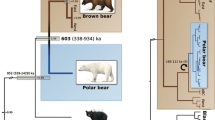Abstract
The differences between classes and individuals are profound and the fact that biological species are individuals rather than classes provides the basis for organizing knowledge on a causal basis. The class of species is a natural kind and there are laws of nature for this and other classes of natural kinds such as the organism and the molecule. Particular species, like other individuals, function in historical narratives by virtue of laws of nature applying to them. The notion that species can evolve by changing their members is a category mistake. Darwin believed that there is no “essential” difference between species and subspecies in the sense that there is only a quantitative difference between them. The concept of biological species is defined on the basis of a qualitative difference. The rank of taxa can be used to distinguish between important natural kinds. Without such kinds language would become purely referential, and have no “sense” as Frege had put it.
Similar content being viewed by others
References
Amundson R (2005) The Changing Role of the Embryo in Evolutionary Thought. Cambridge: Cambridge University Press.
Bertrand Y, Härlin M (in preparation) Historicism and Essentialism in Phylogenetic Biology. Preprint in: Bertrand Y (2008) Relationships between nomenclature, phylogenetics and systematics. Doctoral thesis, Göteborg University, Sweden. ISBN 978-91-628-7544-2.
Breidbach O, Ghiselin MT (2007) Evolution and development: Past, present and future. Theory in Biosciences 125: 157–171.
Darwin C (1871) The Descent of Man, and Selection in Relation to Sex. London: John Murray.
De Querioz K (1998) The general lineage concept of species, species criteria, and the process of speciation. In: Endless Forms: Species and Speciation (Howard DJ, Berlocher SH, eds), 57–75. Oxford: Oxford University Press.
De Querioz K (1999) The general lineage concept of species and the defining properties of the species category. In: Species: New Interdisciplinary Essays (Wilson RA ed), 49–89. Cambridge, MA: MIT Press.
De Querioz K (2005a) A unified concept of species and its consequences for the future of taxonomy. Proceedings of the California Academy of Sciences 56: 196–215.
De Querioz K (2005b) Ernst Mayr and the modern concept of species. In: Systematics and the Origin of Species: On Ernst Mayr’s 100th Anniversary (Hey J, Fitch WM, Ayala FJ, eds), 243–263. Washington, DC: The National Academies Press.
Dobzhansky T (1940) Speciation as a stage in evolutionary divergence. American Naturalist 74: 312–321.
Frege G (1892) Über Sinn und Bedeutung. Zeitschrift für Philosophie und philosophische. Kritik (Neue Folge) 100: 25–50.
Ghiselin MT (1966) On psychologism in the logic oftaxonomic controversies. Systematic Zoology 15: 207–215.
Ghiselin MT (1974) A radical solution to the species problem. Systematic Zoology 23: 536–544.
Ghiselin MT (1988) The individuality thesis, essences, and laws of nature. Biology and Philosophy 3: 367–474.
Ghiselin MT (1997) Metaphysics and the Origin of Species. Albany, NY: State University of New York Press.
Ghiselin MT (2002) Species concepts: The basis for controversy and reconciliation. Fish and Fisheries 3: 151–160.
Ghiselin MT (2005a) Homology as a relation of correspondence between parts of individuals. Theory in Biosciences 124: 91–103.
Ghiselin MT (2005b) Taxonomy as the organization of knowledge. Proceedings of the California Academy of Sciences 56: 161–169.
Ghiselin MT (2007) Is the Pope a Catholic? Biology and Philosophy 22: 283–291.
Hennig W (1950) Grundzüge einer Theorie der phylogenetischen Systematik. Berlin: Deutscher Zentralverlag.
LaPorte J (2004) Natural Kinds and Conceptual Change. Cambridge: Cambridge University Press.
Mayr E (1982) The Growth of Biological Thought. Cambridge, MA: Harvard University Press.
Mill JS (1872) A System of Logic, Ratiocinative and Inductive, Being a Connected View of the Principles of Evidence and the Methods of Scientific Investigation, 8th ed. London: Longmans, Green.
Simpson GG (1951) The species concept. Evolution 5: 285–298.
Wiley EO (1978) The evolutionary species concept reconsidered. Systematic Zoology 27: 17–26.
Wiley EO (1980) Is the evolutionary species fiction? A consideration of classes, individuals, and historical entities. Systematic Zoology 29: 76–80.
Author information
Authors and Affiliations
Corresponding author
Rights and permissions
About this article
Cite this article
Ghiselin, M.T. Metaphysics and Classification: Update and Overview. Biol Theory 4, 253–259 (2009). https://doi.org/10.1162/biot.2009.4.3.253
Received:
Accepted:
Published:
Issue Date:
DOI: https://doi.org/10.1162/biot.2009.4.3.253




